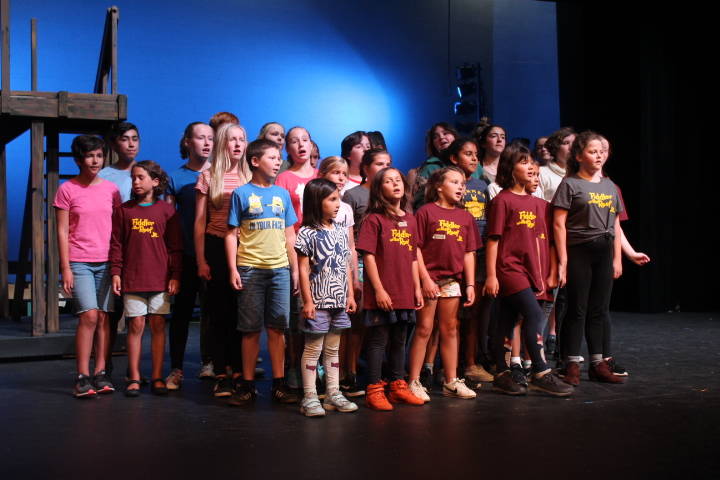ne of the longest-running Broadway musicals, “Fiddler on the Roof,” will be performed by the San Juan Community Theatre’s Music Theatre Camp, a three-week summer workshop for young thespians.
“I’ve been wanting to do ‘Fiddler’ for years now,” Penelope Haskew, San Juan Community Theatre’s Family Theatre director, said. The theater showed an adult version of the classic musical in 2006, however, and she explained that she wanted to leave time between productions.
The musical runs from Aug. 8–10 at 7 p.m. and Sunday, Aug. 11, at 2 p.m. Tickets are $9 for adults and $6 for students. Thursday is “Pay What You Can” at the door.
Haskew has been teaching the camp for five years. This year 46 students ranging in ages from 7-17 will be performing the classic tale.
“Fiddler on the Roof” is based on “Tevye and his Daughters,” or “Tevye the Dairyman,” written by Sholem Aleichem near the beginning of the 20th century. It tells the story of Tevye, a Jewish father, and his three daughters. The focus of the story, according to Haskew, is the personal drama between Tevye and his daughters, especially around the girls’ impulse to stretch their lives beyond the traditions of their parents’ generation. The big picture, she said, of the Jewish people of the fictional Russian Empire settlement Anatevka, Ukraine, being forced to flee their homes is tragically a story that continues to resonate today.
“The connection to people around the world who, this minute, are being forced to leave their homes due to threats of violence is still relevant,” Haskew said. “What would you take if you were given three days to leave, or else? Where would you go?”
One of the songs that leaves Haskew teary-eyed, she added, is “Far From the Home I Love,” in which the character Hodel explains to her father, and clarifies for herself, that her home is now with her love who has been sent to Siberia. Despite the hardship, danger and uncertainty, Haskew added, Hodel sings that she must try to get to Siberia to be with him.
Theatre allows the actors and the audience to inhabit the lives and circumstances of people they might otherwise never meet. This interaction allows both the performers and audience to personally take in the characters’ feelings and imagine life in their shoes, Haskew said.
The students, Haskew noted, have approached the play thoughtfully, curious about similarities to their own lives, such as children not always willingly following their parents’ footsteps, and differences, like how parents once chose spouses for their children.
The young thespians have also solemnly considered the political parallels from 1905 Russia to modern-day issues that center around scapegoating minority groups, Haskew added, and people in power telling those who do not look like themselves to go back to where they came from.
“Our country has been seeing an upswing in hate crimes against all minorities, including Jews, and a surge in neo-Nazi activities over the past few years,” Haskew said, adding that bringing “Fiddler” to the stage felt more important than it would have a few years ago.
One of the lessons Haskew hopes the actors take away from the workshop is the challenge of portraying a character who is different than themselves.
Haskew explained that playing a character older than the actor is difficult because the character has had more life experiences than the performer usually has had.
“As a life skill, I hope the [students] will reflect on this camp as something they can proudly point to as a successful group project,” she added. Each one of the participants has contributed their part and been completely present for one other onstage in order to make the show flow, Haskew explained.
“[Acting] takes trust and focus to create a production like this, and [the students] are each really pulling their weight,” she added.
Haskew also noted that she hopes the audience will keep in mind that this young theater troupe rehearsed the whole show, learned all their lines including memorizing lyrics and dance steps, entrances and exits with a mere 13 days of rehearsal time.
“It is a huge workload, but they take it on with such great attitudes. I could not be more proud of them,” Haskew said.
When asked what she hopes the students take away from performing this particular story, she told the Journal, “Empathy, always empathy.”



